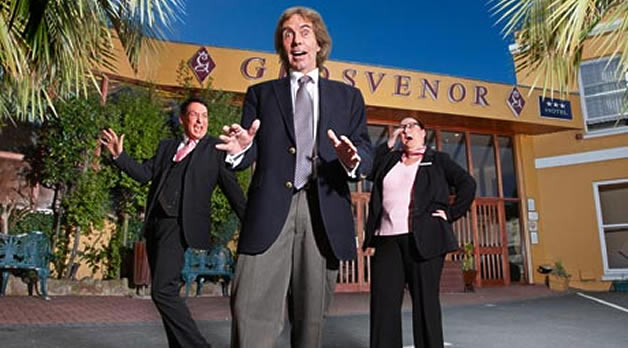Five Hotel Marketing Tips

If you’ve not had the chance to watch ‘The Hotel’ on Channel 4 on Sunday’s I can highly recommend it providing you don’t mind cringing massively for sixty minutes!
The Hotel is a fly-on-the-wall documentary featuring the Grosvenor Hotel in Torquay. The programme features Mark Jenkins, the hard working but calamitous Hotel Manager, Alison, his confrontational Reservations Manager, and Christian, the comedic, perma-tanned Events Manager.
Whilst being car-crash TV at its finest, the show is interesting to me as LAW Creative provides marketing solutions for many hotel and leisure brands. It’s clear from the programme that independent hotels face extremely challenging times because of reduced customer spending due to the economic climate, challenges from branded chains such as Premier Inn, lower margins from third party bookings engines such as Expedia, and staff that simply don’t share the management’s vision or desire to succeed.
With so many challenges a clearly defined strategy is required to deliver against business objectives. The Grosvenor Hotel starts with a ‘stack ‘em high, sell ‘em cheap’ approach which whilst bringing volume to the hotel via coach tours, means that the room rates are extremely low and incremental spend is minimal. In fact a number of events set up by the hotel to drive revenue actually run at a loss. At the start of the new series we find Mark adopting a new approach of trying to appeal to a higher calibre of customer (or ‘Guardian readers’ as Mark refers to the them) which also fails owing to the dreadful state of the hotel, awful food and beverage offering and the poor service tendered by it’s employees. The end result unfortunately is further losses for the hotel.
So what would we recommend to a hotel in a similar situation to The Grosvenor Hotel? The following five tips for effective hotel marketing would hopefully make a difference:
1. Have a Strategy
There’s nothing worse that trying to appeal to everyone and ending up appealing to no one. By having a strategic plan that focuses on who your target customers are and how you will effectively target them will give you the chance to succeed. For instance is your hotel more appealing to leisure or business customers? If it’s both then you’ll need separate approaches to appeal to each group as their needs and wants will differ greatly. Which communication channels (web, social media, press advertising, in-hotel collateral etc) will you consider when you target these customers? A strategy defines your customer, defines the channels you will use to target them but perhaps most importantly defines you as a brand.
2. Embrace Technology
In the programme all bookings are taken over the phone. In 2013 this is unacceptable with the majority of customers using the web to book hotel rooms. An ‘off the shelf’ booking engine solution which could be easily and cost effectively added to an existing website would enable guests to book more easily whilst a small investment in pay-per-click advertising and search engine optimisation would help the website be found more easily by prospective customers searching for ‘hotels in Torquay’.
3. Collect Customer Data
The Grosvenor Hotel has a number of loyal customers, as do most hotels. However customer data including emails addresses is still not collected by many hotels, so they have no way of effectively contacting customers with news and offers to encourage repeat visits and build brand loyalty. Email is low cost and can be extremely targeted providing you know some basic information about your customer. It’s also easy to monitor results of email campaigns to see what’s working and what’s not. And the more data you collect, the more successful you can become moving from basic contact through to predictive personalisation.
4. Have a Plan
The creation of a ‘calendar of events’ is essential to focus the team on revenue opportunities throughout the year. The plan should focus around key events in the year (half-terms, public holidays, sporting events, and key stay events such as Valentines Day). In ‘The Hotel’ we find the team creating a Gala dinner whereby they sell tickets without keeping a record of numbers and choose the menu the day before the event. Subsequently the event makes a loss of around £5 per head. With a solid plan in place events can be organised and managed properly and the team have a point of focus.
- 5. Incentivise the Team
Staff members are perhaps your most important asset within the business. On arrival they are often the first experience the customer has of your brand and will determine whether the customer has a good or bad experience of your hotel. As most people now will review prospective hotels on Trip Advisor prior to booking, it’s essential that staff provide guests with a good experience because whilst customers can look past cracked paint of an older carpet, they won’t accept rude or unhelpful customer service. So it’s essential that staff are ‘on board’ when it comes to your strategy, are aware of your plan so they are informed as to what events are coming up and are trained effectively to provide great service. You can also incentivise them to up-sell to drive incremental revenue. So if they encourage a customer to pay for an upgrade, (yes even at the Grosvenor in Torquay) or order a steak when they would have ordered something else, reward them.
By implementing these five top tips for effective hotel marketing you can drive revenue and succeed in these tough market conditions.
